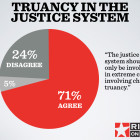
Texas Voters Support Criminal Justice Changes, Survey Shows
|
Texas voters support sending nonviolent drug offenders to treatment instead of jail, according to an opinion poll from Right on Crime, a national campaign for criminal justice reform.
Juvenile Justice Information Exchange (https://jjie.org/page/228/)

In late September, Torri was driving down the highway with her 11-year-old son Junior in the back seat when her phone started ringing.
It was the Hamilton County Sheriff’s deputy who worked at Junior’s middle school in Chattanooga, Tennessee. Deputy Arthur Richardson asked Torri where she was. She told him she was on the way to a family birthday dinner at LongHorn Steakhouse.
“He said, ‘Is Junior with you?’” Torri recalled.
Earlier that day, Junior had been accused by other students of making a threat against the school. When Torri had come to pick him up, she’d spoken with Richardson and with administrators, who’d told her he was allowed to return to class the next day. The principal had said she would carry out an investigation then. ProPublica and WPLN are using a nickname for Junior and not including Torri’s last name at the family’s request, to prevent him from being identifiable.
When Richardson called her in the car, Torri immediately felt uneasy. He didn’t say much before hanging up, and she thought about turning around to go home. But she kept driving. When they walked into the restaurant, Torri watched as Junior happily greeted his family.
Soon her phone rang again. It was the deputy. He said he was outside in the strip mall’s parking lot and needed to talk to Junior. Torri called Junior’s stepdad, Kevin Boyer, for extra support, putting him on speaker as she went outside to talk to Richardson. She left Junior with the family, wanting to protect her son for as long as she could ...

Texas voters support sending nonviolent drug offenders to treatment instead of jail, according to an opinion poll from Right on Crime, a national campaign for criminal justice reform.

Today, the Campaign for the Fair Sentencing of Youth issues the first-ever guidelines for defending children facing our country’s most extreme sentence.

The Washington-based nonprofit Campaign for the Fair Sentencing of Youth (CFSY) released the 24-page “Trial Defense Guidelines: Representing a Child Client Facing a Possible Life Sentence” in response to findings of the U.S. Supreme Court in the landmark 2012 Miller v. Alabama decision.

Makers of a documentary about a Washington, D.C., youth gang of gay and transsexual African Americans have launched an Indiegogo campaign to enable them to finish production and fund the new endeavors of the gang’s work in fashion.

According to a new North Carolina State University (NCSU) and Salvation Army-funded study, 25 percent of homeless children — from infants to early-elementary school age — need mental health services to avoid developmental delays.

As a criminologist, criminal justice researcher and victim advocate, I do want there to be an appropriate response when someone is a victim of crime. But there is a big divide between the popular media image of a victim of crime versus who is most likely to be a victim of crime, according to the data.

My advice to best-practice folks is to change the culture of the community and not limit change to the juvenile justice system as we know it in the traditional sense — the court and its bureaucratic probation counterparts.

While some significant progress has been made, it is imperative that we demand bolder reforms that are focused on child well-being and informed by those who are directly impacted.